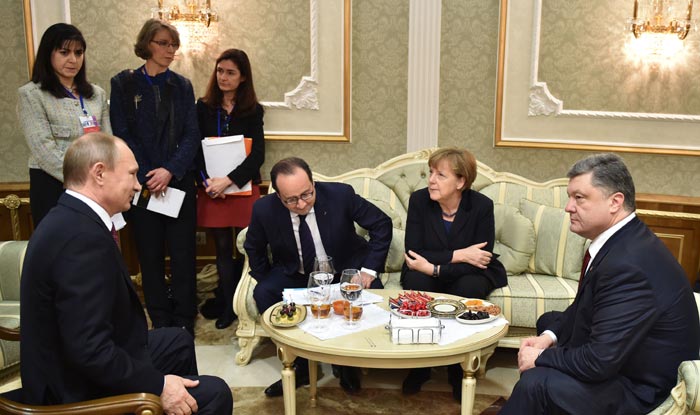Russian President Vladimir Putin, France's President Francois Hollande, German Chancellor Angela Merkel and Ukrainian President Petro Poroshenko attend a meeting in Minsk, aimed at halting a 10-month war in Ukraine where dozens were killed in the latest fighting.
AFP/Reuters/Minsk
Russian President Vladimir Putin said on Thursday that he and the leaders of France, Germany and Ukraine had agreed on the withdrawal of heavy weapons from Ukraine's frontlines and a ceasefire to begin from February 15.
"We have managed to agree on the main points," Putin told reporters in the Belarussian capital Minsk after marathon talks that began on Wednesday evening.
"We have agreed on a ceasefire from midnight February 15," he said.
"The second point that I believe to be extremely important is the withdrawal of heavy weapons from today's line of contact for Ukrainian troops and from the line stipulated in the September 19 Minsk agreements for Donbass rebels."
Putin and his Ukrainian counterpart Petro Poroshenko said Kiev and pro-Russian rebels had signed off on a roadmap to implement the deal aimed at ending 10 months of conflict.
"The contact group signed a document that we prepared with a great deal of tension," Poroshenko said.
Putin said they had agreed "a set of measures to implement the Minsk agreements", referring to the widely disregarded September peace deal also agreed in the Belarussian capital.
He also stressed the importance of constitutional reform and the implementation of a "special status" for the rebel-held areas in industrial eastern Ukraine.
"We proceed from the assumption that all parties will show restraint in the nearest future, before the start of the ceasefire," the Russian strongman added.
'Realities of life'
He said the Minsk talks had dragged on for so long because Kiev was unwilling to directly negotiate with rebels.
"Even though they have not been recognised, one needs to take into account the realities of life," said Putin.
The summit discussions came as pro-Moscow separatists tightened the pressure on Kiev by launching some of the war’s worst fighting on Wednesday, killing 19 Ukrainian soldiers in assaults near the railway town of Debaltseve.
As the fighting escalated, Washington has begun openly talking of arming Ukraine to defend itself from “Russian aggression”, raising the prospect of a proxy war in the heart of Europe between Cold War foes.
The outcome of the Minsk talks is expected to influence discussions at an EU summit in Brussels on Thursday, when sanctions against Moscow will be on the agenda. A deal would likely mean a softer line towards Moscow.

